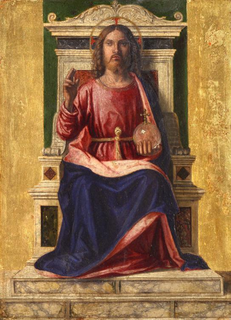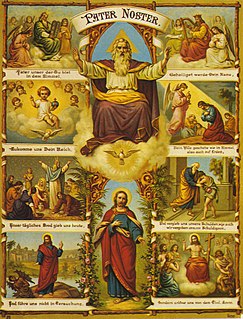Related Research Articles

Adoptionism, also called dynamic monarchianism, is an early Christian nontrinitarian theological doctrine, which holds that Jesus was adopted as the Son of God at his baptism, his resurrection, or his ascension.

In Christianity, Christology, translated literally from Greek as "the study of Christ", is a branch of theology that concerns Jesus. Different denominations have different opinions on questions like whether Jesus was human, divine, or both, and as a messiah what his role would be in the freeing of the Jewish people from foreign rulers or in the prophesied Kingdom of God, and in the salvation from what would otherwise be the consequences of sin.
Impassibility describes the theological doctrine that God does not experience pain or pleasure from the actions of another being. It has often been seen as a consequence of divine aseity, the idea that God is absolutely independent of any other being, i.e., in no way causally dependent. Being affected by the state or actions of another would seem to imply causal dependence.
In Christian theology, divinization, or theopoesis or theosis, is the transforming effect of divine grace, the spirit of God, or the atonement of Christ. Although it literally means to become divine, or to become God, most Christian denominations do not interpret the doctrine as implying an overcoming of a fundamental metaphysical difference between God and humanity, for example John of the Cross had it: "it is true that its natural being, though thus transformed, is as distinct from the Being of God as it was before".

Karl Rahner, was a German Jesuit priest and theologian who, alongside Henri de Lubac, Hans Urs von Balthasar, and Yves Congar, is considered to be one of the most influential Roman Catholic theologians of the 20th century. He was the brother of Hugo Rahner, also a Jesuit scholar.

In Christianity, salvation is the "saving [of] human beings from sin and its consequences, which include death and separation from God" by Christ's death and resurrection, and the justification following this salvation.

Apotheosis, also called divinization or deification, is the glorification of a subject to divine levels and, commonly, the treatment of a human being, any other living thing, or an abstract idea in the likeness of a deity. The term has meanings in theology, where it refers to a belief, and in art, where it refers to a genre.
Communicatio idiomatum is a Christological concept about the interaction of deity and humanity in the person of Jesus Christ. It maintains that in view of the unity of Christ's person, his human and divine attributes and experiences might properly be referred to his other nature so that the theologian may speak of "the suffering of God".
Accommodation is the theological principle that God, while being in His nature unknowable and unreachable, has nevertheless communicated with humanity in a way that humans can understand and to which they can respond. The concept is that scripture has accommodated, or made allowance for, the original audience's language and general level of understanding. Often included in these ideas is the notion of human sinfulness or capacity; so in other words God accommodates himself to the human capacities of those to whom biblical revelation is given.
Hypostatic union is a technical term in Christian theology employed in mainstream Christology to describe the union of Christ's humanity and divinity in one hypostasis, or individual existence.
Miaphysitism is the Christological doctrine upheld by the Oriental Orthodox Churches, which include the Ethiopian Orthodox Tewahedo Church, Eritrean Orthodox Tewahedo Church, Coptic Orthodox Church of Alexandria, the Syriac Orthodox Church, and the Armenian Apostolic Church.

Eutychianism, also known as Real Monophysitism, refers to a set of Christian theological doctrines derived from the ideas of Eutyches of Constantinople. Eutychianism is a monophysite understanding of how the human and divine relate within the person of Jesus Christ.
Binitarianism is a Christian theology of two persons, personas, or aspects in one substance/Divinity. Classically, binitarianism is understood as a form of monotheism—that is, that God is absolutely one being—and yet with binitarianism there is a "twoness" in God, which means one God family. The other common forms of monotheism are "unitarianism", a belief in one God with one person, and "trinitarianism", a belief in one God with three persons.
The image of God is a concept and theological doctrine in Judaism and Christianity. This concept is a foundational aspect of Jewish and Christian understanding of human nature. It stems from the primary text in Genesis 1:1:26–27, which states that human beings are created in the image and likeness of God. Although the exact meaning of the phrase has been debated for millennia the essential principle is that humankind is similar to God and represents God.

In Christian theology, the incarnation is the belief that Jesus Christ, the second person of the Trinity, also known as God the Son or the Logos, "was made flesh" by being conceived in the womb of a woman, the Virgin Mary, also known as the Theotokos. The doctrine of the incarnation, then, entails that Jesus is fully God and fully human.
Eastern Orthodox theology is the theology particular to the Eastern Orthodox Church. It is characterized by monotheistic Trinitarianism, belief in the Incarnation of the essentially divine Logos or only-begotten Son of God, a balancing of cataphatic theology with apophatic theology, a hermeneutic defined by a polyvalent Sacred Tradition, a concretely catholic ecclesiology, a robust theology of the person, and a principally recapitulative and therapeutic soteriology.

Penal substitution is a theory of the atonement within Christian theology, which declares that Christ, voluntarily submitting to God the Father's plan, was punished (penalized) in the place of sinners (substitution), thus satisfying the demands of justice so God can justly forgive sins making us at one with God (atonement). It began with Luther and continued to develop with the Calvinist tradition as a specific understanding of substitutionary atonement, where the substitutionary nature of Jesus' death is understood in the sense of a substitutionary fulfilment of legal demands for the offenses of sins.

Christian theology is the theology of Christian belief and practice. Such study concentrates primarily upon the texts of the Old Testament and of the New Testament, as well as on Christian tradition. Christian theologians use biblical exegesis, rational analysis and argument. Theologians may undertake the study of Christian theology for a variety of reasons, such as in order to:

Theosis, or deification, is a transformative process whose aim is likeness to or union with God, as taught by the Eastern Orthodox Church and the Byzantine Catholic Churches. As a process of transformation, theosis is brought about by the effects of catharsis and theoria. According to Eastern Christian teachings, theosis is very much the purpose of human life. It is considered achievable only through synergy of human activity and God's uncreated energies.

The Last Adam, also given as the Final Adam or the UltimateAdam, is a title given to Jesus in the New Testament. Similar titles that also refer to Jesus include Second Adam and New Adam.
References
- ↑ "Incarnational Humanism: A Philosophy of Culture for the Church in the World". University of Waterloo. Retrieved 5 April 2019.
- ↑ "The doctrine of the Incarnation By David Gibson". Commonweal. Retrieved 5 April 2019.